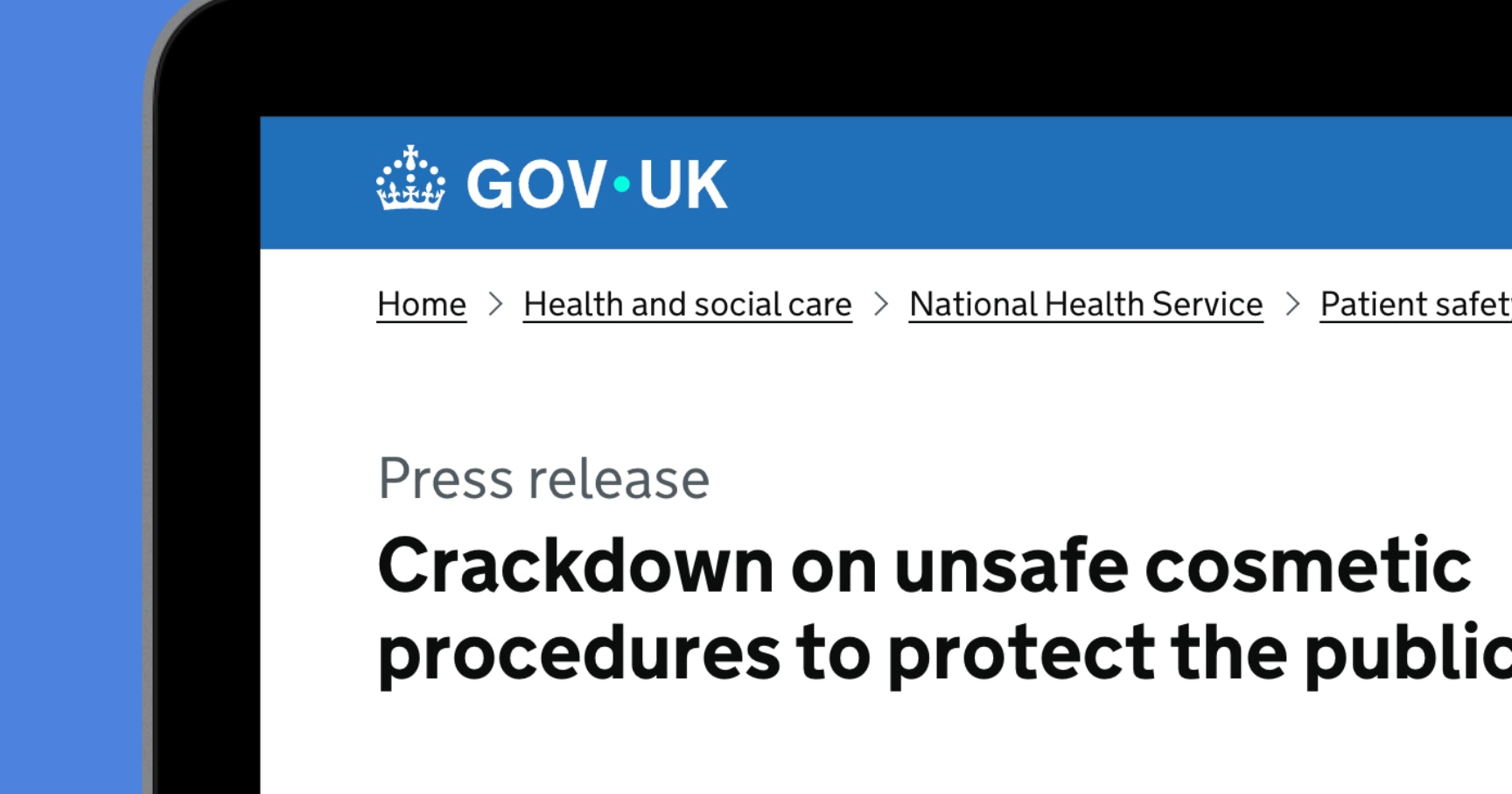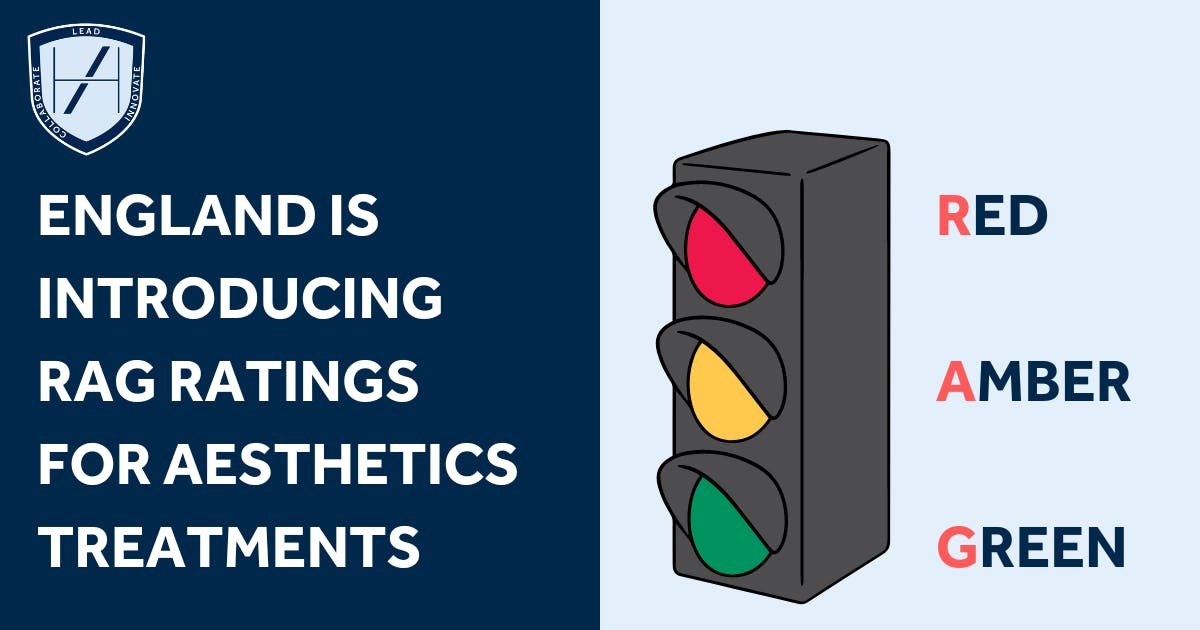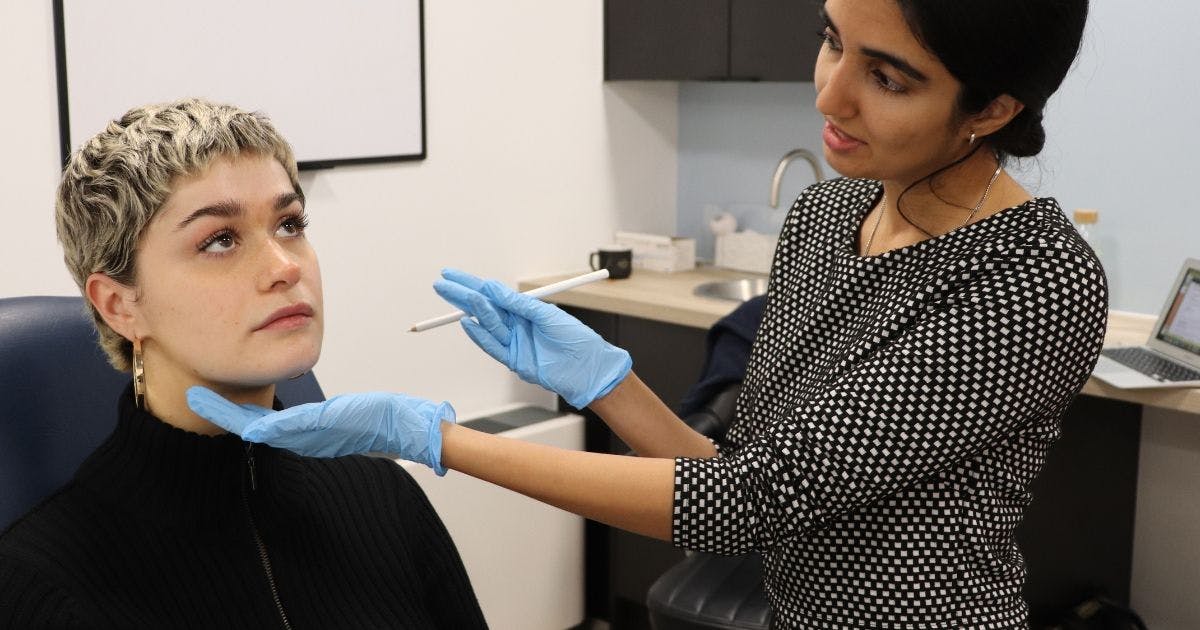Aesthetics Regulation for England: New Government Announcement

The Government has released a holding statement on aesthetics regulation for England.
Unfortunately, the press release, published on the evening of 6th August 2025, simply reiterates the proposals set out in the 2023 consultation. Whilst it’s rumoured that the responses to this consultation may be published later today, this is unconfirmed.
UPDATE 12:00 BST, 7 August 2025: In a second announcement, early on 7th August, the government published its response to the 2023 consultation. We've broken down this information for you, however, there is little movement other than to recommit to many of its original proposals from 2023.
One nugget of information that is somewhat new, may be disappointing to those anxiously awaiting meaningful change. The Department of Health & Social Care (DHSC) has confirmed that it will undertake a new public consultation next year in ‘early 2026’.
It also advises that it will ‘restrict the highest risk procedures first’.
As parliament is now in Summer recess, it appears this holding statement is simply a reminder of the government’s intentions. It does not appear to move the needle, so to speak, on any previously made proposals regarding the aesthetics licensing scheme or other plans.
Let’s look at what was proposed in 2023, versus what this latest statement outlines, so you can be clear on the position…

As stated in the Department of Health & Social Care's 2023 regulatory proposals
Department of Health & Social Care’s statement on aesthetics regulation for England
The following points were highlighted in a short press release published online on the evening of 6th August 2025 by the DHSC.
- “Only suitably qualified healthcare professionals will be able to deliver high-risk procedures such as Brazilian Butt Lifts”
- “Clinics administering fillers and Botox will need to meet strict standards to obtain a licence”
- “Kids to be protected from dangerous beauty trends on social media through plans for new age restrictions on treatments”
- “Robust measures will protect people and save the NHS time and money fixing botched procedures”
- “Other lower risk cosmetic treatments - including Botox, lip fillers and facial dermal fillers - will also come under stricter oversight through a new local authority licensing system”
- “A public consultation will be published early next year. This will seek views on the range of procedures which should be covered in the new restrictions.”
The overarching goal remains to ensure that aesthetic practitioners ‘will be required to meet rigorous safety, training, and insurance standards before they can legally operate’. To achieve this, the government states it will ‘work closely with stakeholders to develop further proposals for consultation on introducing the licensing regime for lower-risk procedures to seek views on education, training standards, qualifications, infection control and insurance’.
The government wants to make it easier for members of the public to identify aesthetic practitioners who are not just competent, but are demonstrably:
- Properly trained
- Qualified, possessing recognised qualifications
- Insured.
Lack of action points
The content of the press release is mostly encouraging quotes from a raft of respected industry experts who’ve long championed tighter restrictions. This includes respected campaigners from both sides of the aesthetics debate.
On the medical side, Professor David Sines, CBE - Executive Chair of the Joint Council for Cosmetic Practitioners (JCCP) and Harley Academy advisor - leant his continued support. Whilst on the non-medic side, Millie Kendall, OBE - Chief Executive of the British Beauty Council - noted how hard everyone was working to reach satisfactory, and safe, outcomes.
Professor Sines commented, “This government commitment is a major step towards improved patient safety in England. It will protect the public from untrained and inexperienced operators and it will save the NHS a considerable amount of time and money putting right the harm done through botched procedures.”
Whilst everyone interested in public safety and driving up standards for the non-surgical cosmetic industry in England echoes this, more substance in terms of timelines and action points would have been better received. That said, early reports about the DHSC announcement on social media received great acclaim. Could it be that people have simply forgotten what was already on the table given it’s been so long..? Let’s remind ourselves of where we’ve already got to.
How these points stack up against 2023 proposals for aesthetics licensing and more
You’ve seen the highlights from this week’s press release above. Now let’s apply them to what we already knew following the 2023 proposals. For a more in-depth look at that announcement, check out our article,Aesthetics Licensing Scheme: Key Proposals Explained.
‘RAG’ rating categorisation of aesthetic treatments by risk
The 2025 press release makes mention of delivering ‘high-risk procedures’ such as the BBL being confined to ‘qualified healthcare professionals’. This is exactly what was already set out in the September 2023 proposals, which state:
‘Red: procedures with the highest risk of complications… We are also proposing to restrict these procedures to qualified and regulated healthcare professionals only.’
‘BBL’ has become something of a morbid buzzword in appeals for government regulation since the first UK death from a non-surgical aesthetic procedure in September 2024. Alice Webb, from Bristol, died following a BBL which was carried out by a non-medic.
Almost a year on, legislation is no further forward. As the anniversary of Alice’s death draws near, we hope there will be further announcements ahead of the 2026 consultation. Although the press release advises this procedure category will be addressed first, that is the extent of the detail.
What else do the 2023 proposals tell us about RAG-rating? Under this system, there are three categories - Red, Amber and Green - with different procedures being proposed for each group. The 2026 consultation will seek to build on the 2023 consultation reponses, to determine exactly which treatments belong in which group.
However, the original proposals, which are echoed in this latest statement, are:
- ‘Green: procedures with the lowest risk of complications. All practitioners are eligible to perform licensed procedures where they meet agreed standards.’ These treatments include minimally invasive treatments such as some chemical peels
- ‘Amber: procedures with medium risk of complications. Non-healthcare professionals must be licensed and have relevant oversight by a named regulated healthcare professional (who has gained an accredited qualification to prescribe, administer and supervise aesthetic procedures)... Qualified and regulated healthcare professionals are eligible to perform these procedures without oversight where they meet agreed standards.’ This category houses more invasive procedures such as neurotoxins and filler treatments.
- We have already explored the Red category, which is reserved for the most high-risk treatments, such as those involving intimate body parts and the most invasive procedures. This is recommended to be restricted to appropriately qualified healthcare professionals only, working from Care Quality Commission registered premises.
A licence will be required to practise botox and fillers
The August 2025 update, reminds us that anyone wishing to offer treatments such as botox and fillers, must ‘meet strict standards to obtain a licence’. This is a somewhat vague statement compared to in 2023.
Then, it was proposed that practitioners must obtain both a licence to practise aesthetics, and a licence for their premises. We explained this in more detail at the time.
The aesthetic practitioner licence was to be predicated on a specific standard of education being attained via reputable aesthetics training.
Whilst the exact qualification was not set out, the Health Education England (HEE) framework for the provision of aesthetics courses was referred to. This is the exact framework to which the Level 7 Diploma in Cosmetic Injectables was mapped from its inception almost 10 years ago. And, at Harley Academy, we have only improved upon this accredited, Ofqual-regulated and JCCP-approved postgraduate course since then, making it even more rigorous.
The premises licence was to be obtained from the local council and, again, health and safety criteria would be mandated. One of the key reasons behind this was to crack down on unsafe environments such as ‘Botox parties’ and pop-up clinics. Given recent data has found some injectors practising out of public toilets, this cannot come soon enough.
So, as you can see, this too is nothing new.

Placing minimum age restrictions on aesthetic treatments
England was the first country in the UK to pass a law providing a minimum age requirement for non-surgical cosmetic injectable treatments. In October 2021, it became illegal to treat or consult under 18s for aesthetic treatments such as botox and fillers.
As other countries within the UK did not follow suit, a ‘border hopping’ issue evolved, as teens crossed into Wales or Scotland for treatment.
The government may seek to amend this legislation for England, as it looks to allow certain procedures for under 18s, if they’re approved by a medical professional. However, the main issue here is applying joined-up logic across the UK.
Non-medics to be able to inject botox and fillers in England ‘with oversight’
One of the most controversial proposals from the 2023 missive was that procedures in the Amber category may be carried out by non-medics. This means treatments such as toxin and dermal fillers could be injected by non-medics, who can be classified as ‘qualified and trained practitioners working with clinical oversight.’
What exactly ‘oversight’ means has still not been clarified - in the room, known as ‘line of sight’ or simply in the building. But this was highly unpopular among healthcare professionals who believe this level of ‘invasiveness’ should be restricted to appropriately trained, qualified, insured and accountable medical professionals only.
The 2023 consultation responses were never made publicly available. However, we know many of you submitted your objections - as did we.
In fact, this aspect has been brought more sharply into focus since Scotland announced its own plans for aesthetics regulation earlier this year.
Scotland has advised that Health Improvement Scotland (HIS) registration will be required for all aesthetic practitioners administering Group 2 and 3 procedures. These are the equivalent of England’s Amber and Red categories, and HIS is the Scottish equivalent of England’s CQC. This means non-medics would need to work from regulated premises.
England, however, has no such requirement for CQC registration for Amber procedures, removing that extra layer of security. Each local authority will be responsible for awarding and providing aesthetics licences to Green and Amber category practitioners who meet the yet-to-be-determined standards.
Whilst healthcare professionals in England will no doubt enjoy this loophole, given they won’t be required to go through the long and arduous process of CQC registration. It does mean that non-medics - who, unlike medical professionals, are not answerable to any professional regulator - won’t have to go down this route either.
Whether this gap is addressed in the 2026 consultation remains to be seen.
What does this mean for aesthetics regulation in England?
Essentially, this update tells us nothing we didn’t already know. It seems to be a simple reiteration of the government’s intentions to introducing regulatory changes.
Given the heightened media attention the lack of regulation has received in recent months, it’s likely the DHSC felt compelled to remind people of its proposals.
Coordinated awareness campaigns from industry bodies such as SaveFace and BAMAN, supported by national media, including ITV News and flagship daytime TV show, This Morning, have made the topic unavoidable.
Labour Health Minister, Wes Streeting has been questioned about this topic on live TV many times over the past few weeks. However, other than acknowledging the urgency and seriousness of the matter, no action or timelines were forthcoming.
As parliament is now on Summer recess, it’s likely this press release is a recommittment to the ideals set out by Labour’s predecessors in 2023. Now we wait for further announcements and the opportunity to provide further feedback via the next public consultation in 2026.
For any healthcare professionals considering aesthetics training now who want to know what regulation may mean for them, book a call with our team. They’ll be happy to discuss this with you.
Or, if you’d prefer to attend one of our online events which explore How to Get Started in Aesthetics, we’d love to answer all your questions then.
As always, we’re keeping close to this topic which is close to our hearts here at Harley Academy, and will update you as soon as significant information is made available.
All information correct at time of publication
Download our full prospectus
Browse all our injectables, dermal fillers and cosmetic dermatology courses in one document
By submitting this form, you agree to receive marketing about our products, events, promotions and exclusive content. Consent is not a condition of purchase, and no purchase is necessary. Message frequency varies. View our Privacy Policy and Terms & Conditions
Attend our FREE open evening
If you're not sure which course is right for you, let us help
Join us online or in-person at our free open evening to learn more
Our Partners













STAY INFORMED
Sign up to receive industry news, careers advice, special offers and information on Harley Academy courses and services


